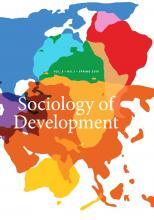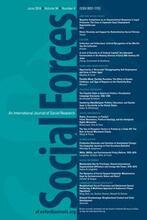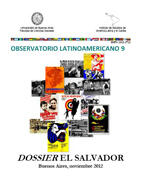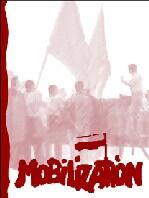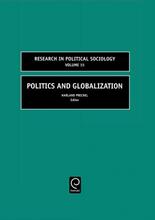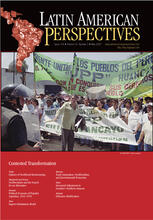The mass mobilizations against neoliberal reforms are rooted in the weakening of the state-led development model and the erosion of social citizenship rights. At the same time, infrastructures created by the developmental state provide the organizational capacity to resist market-driven globalization. The study develops a conceptual framework for understanding the major arenas of state-led development in the twentieth century in relation to the infrastructures and organizations that mobilize social movement campaigns against neoliberalism in the twenty-first century. Special attention is given to public education, health care, public utilities, state subsidies, and transportation networks as laying the foundation for civil society’s ability to collectively defend social protections granted in the preglobalization era in the global South.
Publications by Type: Journal Article
2015
Historical shifts in global economic formations shape the strategies of resistance movements in the global South. Neoliberal forms of economic development over the past thirty years in Central America have weakened traditional actors sponsoring popular mobilization such as labor unions and rural cooperatives. At the same time, the free market reforms produced new threats to economic livelihood and well-being throughout the region. The neoliberal measures that have generated the greatest levels of mass discontent include rising prices, privatization, labor flexibility laws, mining projects, and free trade. This article analyzes the role of emerging anti-neoliberal political parties in alliance with popular movements in Central America. Countries with already existing strong anti-systemic parties in the initial phases of the global turn to neoliberalism in the late twentieth century resulted in more efficacious manifestations of social movement partyism in the twenty-first century resisting free market globalization.
2012
Using a unique dataset on the geographic distribution of reported protest events from local sources, the study explains the variation in community-level mobilization in response to neoliberal reforms in two countries in the global periphery. Building on insights from macro, cross-national studies of protests related to market reforms, this article highlights local structural conditions that more likely generate popular contention in poorer countries. Count regression models show that localities with greater levels of state and community infrastructure (highways, administrative offices, universities, NGOs and local chapters of oppositional parties) were associated with heightened collective action opposing the privatization of health care and public utilities. These state and community infrastructures were shaped by national contexts in the era of state-led development preceding the current epoch of accelerated globalization.
2010
Esta investigaci\ on se enfoca en las elecciones presidenciales e hist\ oricas en El Salvadoren 2009. Hay un \ enfasis dado a la transformaci\ on del partido pol\ ıtico FMLN en laera despu\ es de la guerra civil y la alianza entre el partido y los movimientos socialesen la sociedad civil. La combinaci\ on de los procesos de la democratizaci\ on y laspol\ ıticas de liberalizaci\ on econ\ omica en los 1990 y 2000 aport\ o al reforzamiento de lacoalici\ on entre el partido de la izquierda y los movimientos populares. Gradualmenteel FMLN se pod\ ıa canalizar la energ\ ıa de las campañas de los movimientos socialescontra las pol\ ıticas neoliberales y opini\ on p\ ublica en triunfos electorales al nivellocal, parlamentario y Ejecutivo.
2009
2008
In the 1990s and early 2000s, government privatization and austerity programs served as the cornerstone of free market reforms implemented throughout the developing world. The selling off of government utilities, resources, and services laid the groundwork for a highly contested battleground in the global South over social and economic distribution. This study examines the sequencing of campaigns against neoliberal reforms in Central America. Two successful movement campaigns against privatization in El Salvador and Costa Rica followed failed collective attempts to impede similar economic reforms. The policy outcomes against neo-liberal measures are explained by the path-dependent nature of the organizing templates activists chose to employ and the breadth of social movement unionism achieved. The article offers insights into similar battles currently waged in the third world over the pace of economic globalization and the conditions in which oppositional movements are likely to succeed or fail.
Purpose – This study identifies the multiple contributions of the Salvadoran women’s movement in sustaining mass mobilization under the threat of public health care privatization.Methodology/approach – A case study methodological approach shows how the emergence of an autonomous women’s movement in El Salvador in the late 1980s and early 1990s ‘‘spilled over’’ (Meyer & Whittier,1994) to assist in the maintenance of the health care campaigns in the late1990s and early 2000s.
2007
The paper addresses a core question in the literature on states and political challenges from excluded social classes: how is large-scale collective action possible against repressive governments in the global periphery? Using the case of El Salvador’s 1932 peasant-worker uprising, the paper contributes to theories of organizational expansion and radicalization in nondemocratic settings. The case study suggests that periods of regime liberalization deposit organizations in civil society that persist beyond the political opening in the system. Combining historical materials with logistic and hierarchical linear modeling (HLM), it is found that the political threats constituting liberalization reversals provide negative incentives for surviving reform-minded organizations to attempt revolutionary forms of collective action in more hostile political environments.
In the current wave of defensive collective action across Latin America in response toneoliberal globalization, working-class groups appear most frequently in the documentedprotest events. The new wave of popular movement activity emerged in the region in thelate 1990s and early twenty-first century and is driven by the erosion of the economicand social benefits previously available to the popular classes during the period of stateleddevelopment.

